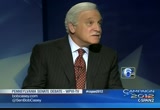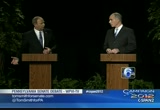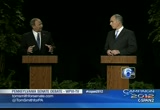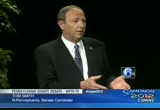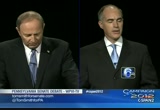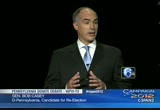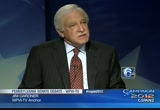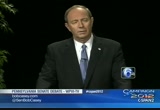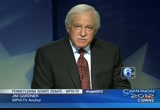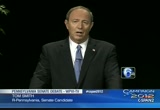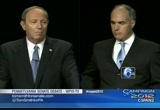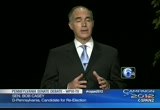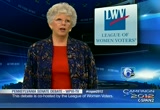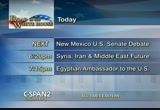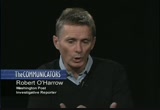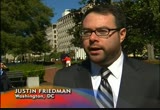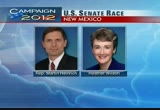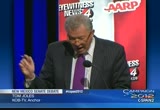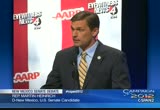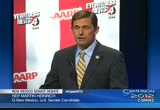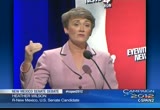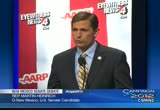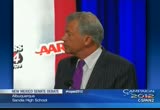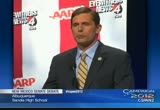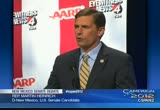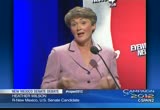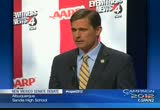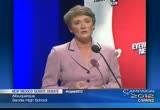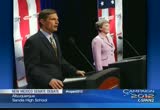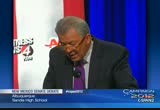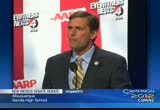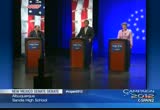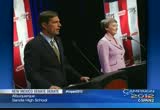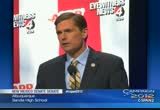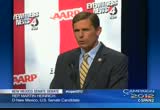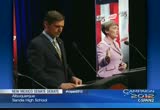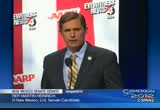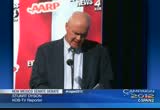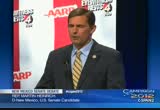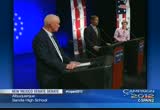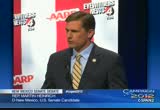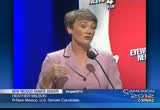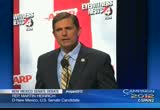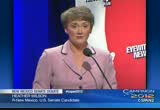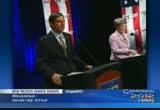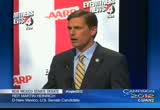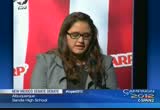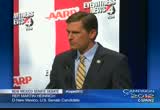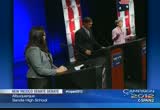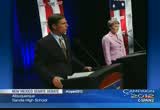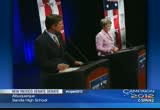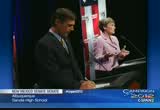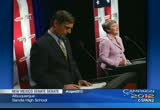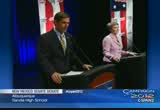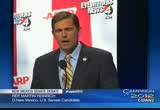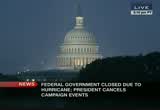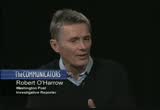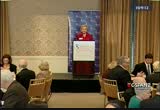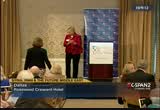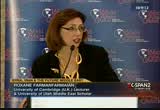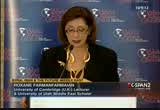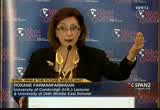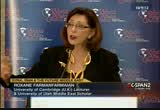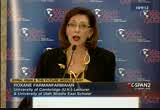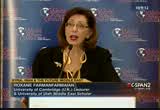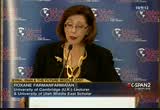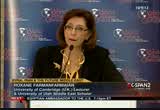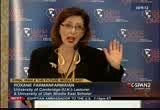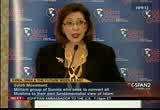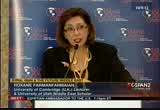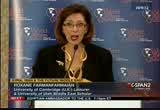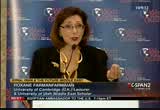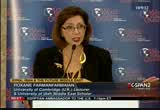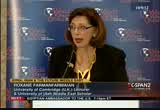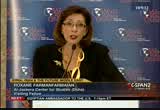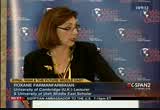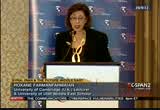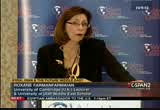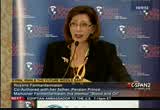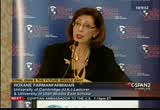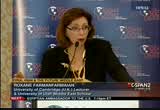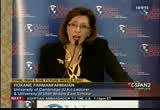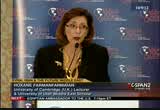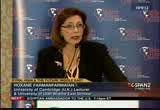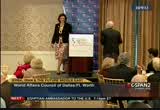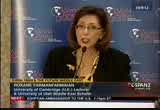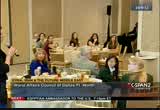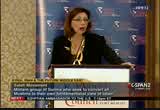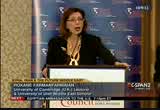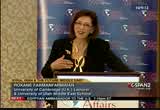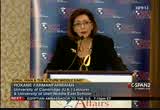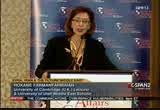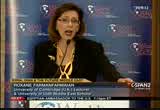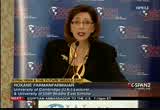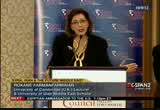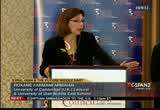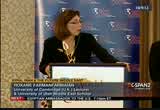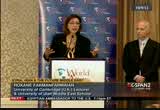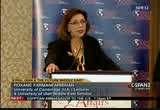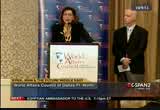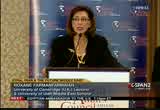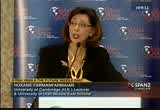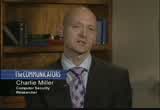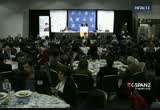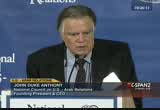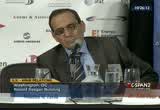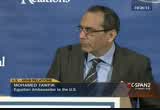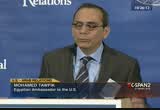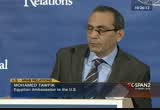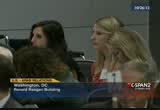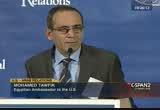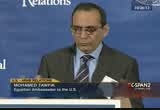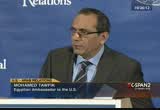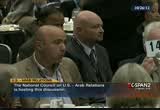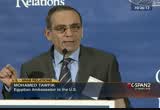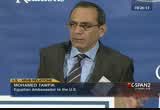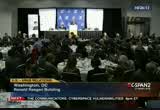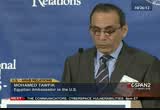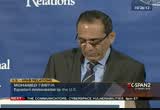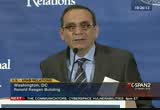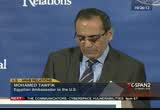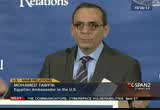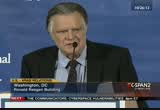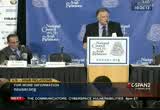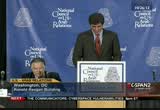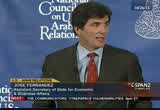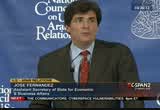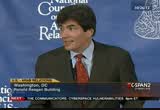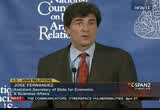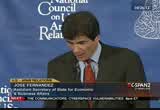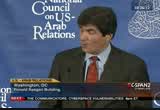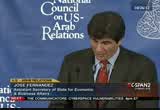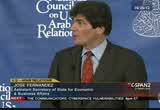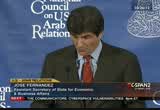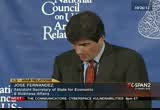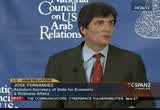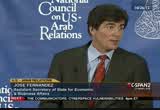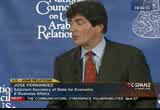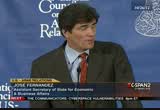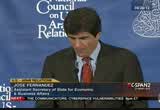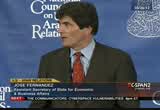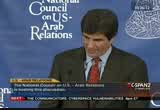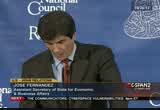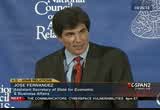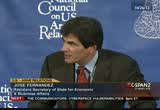tv U.S. Senate CSPAN October 29, 2012 5:00pm-8:00pm EDT
5:00 pm
we've got to make sure they don't get this capability. >> moderator: mr. smith, you have at least two minutes. [laughter] smith: well, i don't think i'll need two minutes to explain my stance on iran. we must make sure they do not get nuclear weapons. i mean, and, you know, where we're at on that, are we really sure, you know, certain scientists say this and the cia and -- but i'll take them at their word, that they don't have them yet. and we've got to keep using all the tools we can to insure that they don't. ..
5:01 pm
there was a few things senator kec had said we back but we will media let that go with. but senator, you keep bringing up that my plans within medicare it would end social security. no, they want. and if you read the plan you would see that. another point that you brought up is endorsed the ryan plan. no, i said they were plans. at least if they have a forward thinking and the courage to bring out various plans.
5:02 pm
which few people in your party on how we get social security secure, how we get medicare secure let's take these plans and have an adult discussion because we cannot continue the very near hitting the sand but there's been many things you've said that tom smith said we've never -- i've never said that. i am speaking for my plan, written plan, so please take a look at the plan and then you will see that i don't want to and social security for seniors. it emphatically states that seniors on it now i will do nothing. that will be protected. that's between the government and the them. that's protected. but all i had some plans that will save it for the long haul and i will end at that. you're very gracious with time.
5:03 pm
smith: de leggitt rebuttal time? >> moderator: how much you need? how about 15 seconds. smith: the most radical proposals in the congress and the senate any way that a grand total of 16 votes was the so-called rand paul plan. the rhine and budget has all kind of problems because when it comes to medicare, this is a basic debate about ending the medicare guaranteed benefit preserving my record indicates not just preserving but strengthen. >> moderator: monica ag you have the last question. >> because of the economic downturn, the education in our country has had to squeeze from every angle, city budgets for education have dropped, state budgets have dropped, so it makes it challenging most experts would say to believe our students in the future will be competing on a level playing field with other students around the world because the bigger class size is now and less time with quality teachers. how would you improve education
5:04 pm
first of all and in fact mr. smith you suggested eliminating the department of education altogether. is that the right plan at this moment? casey: the best place is that the state level. that is where between the local school boards, teachers and parents. now i don't -- i said i wanted to take a look at the department of education, and it's possible. but they do some good things so we don't want to throw that away. but we need -- any federal organizations basically as big as the department of education there is a lot waste. just to get that money to the states. they can do it themselves and that is a state issue but it would be more economical doing that. and we need to eliminate a lot of mandates mandated by the department of education. that's what i don't think a lot
5:05 pm
of career politicians, which i'm not, but a lot of career politicians really don't grasp how these mandates that the federal government mandates down to the state including education. they have to be paid for and it falls to the state's usually. the federal government will mandate. let's eliminate that and use our money wisely, focus it like a laser on bill local schools and the teachers and the school board's. that's how you improve education. >> moderator: mr. casey? casey: monica, this is important as it relates to the long-term economic growth because we've invested in education, because we've educated the world and then we began to elevate the world over time, we got a big economic image. some of that has eroded over the last generations we have to make smart traces. proposing or supporting, with
5:06 pm
ever does come to eliminate the department of education doesn't make a lot of sense and i don't think there is support for that. in addition to stopping the proposals like that from coming into effect, we need to invest in children and the dawn of their life. early education is critical. some of the greatest supporters are the ceos of big companies because they know if we invest then that person will grow and develop and the high skilled worker, number one. number two is the federal government and i think there is some agreement between the two of us and the federal government can be a partner and held on the elementary and basic education that can't dictate and shouldn't dictate and shouldn't try to have a one-size-fits-all policy. most of the work as it relates to the local schools are done at the def district level. we have the district in this state. folks there one to keep local control of the schools. we should do that but we can make changes to what used to be known as no child left behind. so far a lot of the changes have
5:07 pm
been bipartisan and we should continue that. >> moderator: we haven't talked about race. in the case of fisher versus texas, the supreme court is once again taking up the issue of whether there should be a racial preferences in the admission to colleges and universities that accept federal dollars which means almost all of them. if the supreme court should decide that race should no longer be part of a decision making process as to whether an individual gets admitted to a college or university what would be your reaction. is it appropriate to race no longer part of that formula or should it continue to be part of the formula and we both have no more than 40 seconds to respond. mr. casey you go first. casey: jim, thanks. if the supreme court were to make that decision would be a radical departure from where we've been over the generation. it would be a step in the wrong direction.
5:08 pm
we still have a way to go to make sure that the kind of discrimination which was in place for many generations is rectified that in justice is dealt with completely. we can have a big debate over how to do that but i don't think that we should take a radical departure from where we've been. and i hope, i hope that our supreme court wouldn't make a decision that could be based upon the ideology rather than what is best for the country to make sure that we are right on going wrong. >> moderator: mr. smith? smith: jim, when you ask that question, why was thinking i even with the great doctor, martin luther king, said in that speech of his that we should be judged not by the color of our skin that the content of our character. and i believe that we should try to end discrimination and bigotry wherever we find that. if we overturn that i don't
5:09 pm
think the federal government should be discriminating against anybody. and basically that's what this does. we need to work to in all of that without legislation so to speak. >> moderator: gentlemen, thank you so much. that concludes the question and answer portion of the debate tonight. mr. tce won the coin toss for the closing statement orders and he has elected to defer he will take the ball in to begin the second half so mr. smith, you're closing statement goes first. smith: i want to thank you and monica and the league of women voters for having us here today. my wife and i have been very blessed. we have six daughters and a son. after our three biological daughters were pretty well
5:10 pm
grown, we adopted them and that the group together has given sandy and i9 grandchildren this far. the youngest of which is less than a month old. when that little fellow commended the world, he was $51,000 in debt because of our national debt. while everyone in the generation fights over who among us deserves how much, who deserves credit for building what? and how much money we can spend on ourselves right now. who is going to stand up for our children and their children? i am just an old farm boy that got missed placed in the coal mines and wound up in business. but i grew up in an american
5:11 pm
farm you could follow your dreams and achieve success. but els i watched the basketball teams and youth groups and scouts laughing and playing in the gym behind my house, i worry about their america. the america which you and i will soon turn over to them. i will never give up on this country. i love america because of the god giving freedom that america represents. i ask you to join me in that belief and in this cause. i appreciate it and thank you so much. >> moderator: mr. t. c.? casey: i want to thank the league of women voters and tom smith tells well. the time i served in the united states senate i've been an independent voice for the people in the state and i've gotten results from the people of the state. in this campaign today, seven newspapers have made an editorial the as to who they
5:12 pm
would endorse. and all seven endorsed my candidacy. one of the reasons, not the only but one of the reasons that those newspapers endorsed me from the spread to california and a lot of places in between because of my record and the results that i achieved for the people in the state either leading the fight to cut the payroll tax for millions of americans and in pennsylvania so they could of dollars in the pocket to be doubled to invest in the economy, trade adjustment when the workers lose their jobs because of the unfair foreign competition and i let the fight pass that legislation given the training they need to get back on their feet. the so-called dredging plastic the deepening of the channels on was the key player in getting the most recent funding for that so getting results is key for the economy, and i have the honor to have served the people of pennsylvania to have earned their trust and i would ask again to have the opportunity to
5:13 pm
earn the trust and i would ask for your vote on november 6. thank you. >> moderator: speed become a gentleman that concludes the debate and we want to think the candidates for taking part in this important program. we also want to think of course monica malpass and vernon odom from action news and thank you for watching. now we have these final words from our co-sponsors and thank you so much for being here. >> i of the league ofwomen voters of pennsylvania citizen education fund thinks the candidates for participating in this debate. we are grateful to wpvi for their partnership and commitment to informing citizens a keystone of democracy. you do not need a valid for whitey to vote on election day. only those new to the polling place and registered voters must show proof of residency. learn more about the candidates on the week of online voter's guide and help make democracy work. but tuesday, november 6.
5:14 pm
thank you for watching. the hurricane has shut down the federal government for the day and several local school systems through tomorrow. many of the events we had planned to cover have already been canceled. we will keep you up-to-date with any announcements as the storm makes landfall later today. elsewhere the new york stock exchange closed for business
5:15 pm
today has also announced it will be closed tomorrow. if you consider that a while ago no one would ever agree to carry around a tracking device and no one would have ever posted olet anyone read their e-mail but right now a lot of us use gmail and it's stored on a server so it is just interesting that as a society we have given our information up. >> we were looking into site were and cybersecurity and the cyber war. the pentagon had declared cyberspace the environment of people and machines and networks as a new domain of the war and yet we realized that maybe one in a thousand people really understood what cyberspace was and the degree and death of the
5:16 pm
vulnerabilities. and so, what we are trying to do in the series is take pieces of it and explain the fundamentals and the platonic idea is that everybody from my mom and dad and congress and people around the country can understand and so maybe start the process of coming up with ways to defend cyberspace better. we have a pretty simple proposition. you can either embrace the kind of approach commerce one wilson has embraced. she signed the pledge to support the cut cabin balance program. that's a tea party approach to balancing the budget and it has no new revenues even for the wealthiest americans. and it is so draconian that would require deep cuts in social security and medicare over time or we can member is a balanced approach.
5:17 pm
that's what i support and i think we can go back to the kind of tax rates we had under the clinton administration and those upper income earners were doing well in the entire economy was growing. we are going to have to make some tough choices and a balanced approach is the only approach that i believe will get us there. >> you're rebuttal? >> it's amazing that you can stand here having voted for a trillion dollar deficit for the last four years. the largest, fastest that increase in american history and say that we have to control spending. you have done nothing to control spending over the last four years. with respect to cut cabin balance it's amazing to me also that the idea of cutting wasteful spending, capping the ability of congress to spend money we don't have, and balancing the budget is extreme. i think it would force the congress to set priorities and stop funding things like cylinder solyndra and prioritize like social security, medicare
5:18 pm
and education and that's why i support the balanced budget to the constitution. >> i especially like watching the gavel-to-gavel coverage. it is really only the place to get the real deal and i also enjoy newsmakers and the book programs i like that the commentary is only intended to let you know what is going on and there isn't really much analysis. they're certainly isn't an opinion, and i appreciate how i can really see through and understand the programming itself and i can get my analysis elsewhere. if you want to see how your government works directly, c-span is just about the only place to go.
5:19 pm
next u.s. candidates representative martin heinrich a democrat and former representative heather wilson, republican, square off in their third debate in one of the closest races in the country. the cook political report rates this race as leaning democratic. we picked this the date up right after the candidates opening statements. this is about an hour. >> good evening. i am, and welcome to kotb set the date. our sponsor is aarp. we are glad they are with us. this debate is being saimaa simulcast on a retial partner that would be 770, kklb-am. on and on the stage we have democratic candidate martin heinrich and republican
5:20 pm
candidate had their wilson and they are to replace john bingaman -- jeff bingaman who is retiring. both candidates have agreed to the debate rules to each candidate will have one minute to make an opening statement later they will have one minute for a closing statement. the candidates will be given one minute to answer each question and then 45 seconds each for the rebuttal. later the candidates will be allowed to ask the other candidate a question which is often very enjoyable. the answers will be limited to one minute and each will have 45 seconds for a rebuttal. martin heinrich won the coin toss and he's been selected to go second with his opening statement. so, heather wilson, please go ahead with your opening statement. wilson: thank you, tom, for hosting this this evening. we have two kids at home, one about to go to college and another one that is the queen of her universe in high school, and i worry about them. i whether there will be jobs for them when they finish school and
5:21 pm
there is nothing more important in america today and moving forward towards strong economic growth and job creation that means keeping taxes low so that small businesses can invest and grow. it means getting rid of a lot of this red tape that's coming out of washington and putting a moratorium on job killing regulations. indians and all of the above energy strategy because the fastest way to american jobs is american energy. and a means forgoing these across-the-board defense cuts that, this man heinrich supported so that we don't lose another 20,000 jobs next year. that's what i will do in the united states senate and i look forward to the discussion this evening. >> martin heinrich, your opening statement. heinrich: growing up my dad was an electrician. my mom worked in a factory. they worked hard and stretched every dime but there were still tough times along the way. so, i know what it's like to struggle in a tough economy. and i'm running for the senate because i want our children,
5:22 pm
yours and mine, to inherit the kind of country that we all believe in growing up. an america where you prosper if you work hard and play by the rules. i want you to know that my priorities are mexico's priorities. protecting social security and medicare. tax cuts for the middle class, keeping our promises to our veterans and making college more affordable for everyone. i come home nearly every weekend so i can hold the job fairs to meet with the mexicans and raise my family. i've always fought for the things that matter most to the mexicans and i will continue to do that in the senate. >> moderator: was the first question with the deficit increasing by the second economic recovery, what would you as a u.s. senator do about taxes and what would you do about spending? we will begin with martin. i think what is critical was to take a balanced approach. every single bipartisan group that's gotten together butter it
5:23 pm
is simpson-bowles. if you look at both sides of the equation and increase revenue and make cuts to existing programs we are going to have to weather some challenging kids in the future because spending is too high but we also have to increase revenues. it's fair to ask people what the upper income levels to shoulder the same responsibility that middle class families shoulder today. it's not right that people like mitt romney who is worth hundreds of millions of dollars a year peace 30 or 14% and effective tax rates while small business people and teachers and firefighters' pay much more. with a balanced approach we can meet this challenge. >> moderator: however, talk about taxes and spending. wilson: this is one of the area's congressman heinrich and i disagree. he is holding the entire staff hostage for a tax increase on the first of january because he wants to increase taxes on the
5:24 pm
upper brackets. half of the tax returns in those upper brackets are small businesses, the engines of economic growth in america. currency and young did a study last summer and looked at what would be the impact of adjusting taxes the way congressmen heinrich wants to do and we would lose another 4,300 jobs here in new mexico. i think what we need to do is extend all of the tax rates that we have now and go through a yearlong process of the tax simplification. takeout almost all of the exemptions and special provisions, lower the rates and broaden the base and give ourselves a tax code that is through econmic growth. then we also hae to control spending and have spending growth that is lower than the rate of growth of our economy. we are also going to have to reform some big programs, and i believe that the media last budget amendment to the constitution. >> moderator: i saw you make of these ovr there. you have 45 seconds for a rebuttal. heinrich: we have a pretty simple proposition here.
5:25 pm
you can either embre the kind of approach the congresswoman has embraced. she signed this pledge to support the cut cabin balance program. that is a tea party approach to balancing the budget it has no new revenue even for the wealthiest of americans and it is so draconian that would require deep cuts in social security and medicare over time. or we can embrace a balanced approach. that's what i support. i think we can go back to the kind of tax rates we had under the clinton administration when those upper income earners were doing well and the entire economy is growing. we have to make some tough choices and a balanced approach is the only approach that i believe will get us there. >> moderator: you're rebuttal? wilson: is amazing, congressman heinrich, you can stand here having voted for trillion dollar deficits the last four years. the largest, fastest debt increase in american history and say that we have to control spending. you have done nothing to control
5:26 pm
spending over the last four years and with respect to the cut cabin balance it's amazing also that the idea of cutting wasteful spending, capping the ability of congress to spend money we don't have, and balancing the budget is extreme. i think it would force the congress to set priorities and stop funding things like solyndra and prioritize like social security, medicare and education and that is why i support a balanced budget amendment to the constitution. >> moderator: with the fiscal cliff looming including the president saying even if we don't go over the cliff, we still need to cut defense spending what would you as a u.s. senator deutsch to save jobs at the military bases and national laboratories? wilson: this is also an area congressman heinrich and i have disagreements. congressman heinrich was the only member of the delegation to vote for this process that would lead to the across-the-board tax cut starting in january.
5:27 pm
we have already lost 30,000 jobs here in new mexico since he went to congress and the average household pay is down by $4,000 per family for take-home pay. the congressman didn't vote for this, congressman peters didn't vote for this, but congressman heinrich did. i will work to restore those defense cuts and avoid a devastating impact of the national security and the devastating impact to the jobs here in new mexico. >> moderator: martin? heinrich: it's important to remember from seat we are seeking to fill. senator jeff bingaman said that version of what i voted for was a huge distortion and it is. i voted to make sure as the country that we didn't the fall on our obligations. it was the tea party that forced us in the position of not passing the clean piece of legislation. and i think what is incredibly
5:28 pm
important is that if we bring a balanced approach to this and don't do the cut only approach, we can completely erase the impact of sequestration. i stood up to my own party and fought for the bases and fought for our national labs we should put off funding the facility at los alamos. i wish heather wilson would have stood up and fought for the national labs when the budget was seeking to count was almost 17% or sandia and 11%. i voted against were lovers in the house in 2007 and as for standing up to your party on the national labs, you voted for the continuing resolution that zero of the funding for the national labs and the plutonium facility of los alamos and you didn't even offer a single amendment or lift a finger to try to save it. i think that mexico needs a united states senator that understands new mexico's segment
5:29 pm
ebit contribution and will stand up and fight for it. you voted for the across-the-board cuts and you didn't save the plutonium facility of los alamos and you lost the aircraft for the guard and mexico and we now have the smallest error guard of any state except for guam. i think we can do better and i intend to in the united states senate. >> moderator: martin coming your rebuttal? heinrich: there were a thousand people working at the 150's air guard and there were people working out there today. and they have a job because i stepped up and found them a new mission. when congresswoman heather wilson failed to do that at the end of her term, no, they are not flying f-16s the flying the c-130 and the age 60 payfox but it's not about their plans to be it's about people. it's about the jobs, it's about the people that are putting food on their family from those jobs and i will continue to fight for the forward thinking,
5:30 pm
forward-looking missions to make sure that our installation spoke in defense and energy are strong well into the future. .. term in congress we fought for the dream act. those are kids that represent some of the best things about the country. many of them continue know another country. many are willing to serve in the
5:31 pm
military, or become a doctor and give back to the community. i was disappointed it song so long as for my opponent take a position on the dream act. it's a position that needs leadership. i have shown the leadership. we are going to continue for a forward-thinking immigration policy. >> around the world waiting to come to this country and willing to respect our laws. i support legal immigration. i think we need changes to our immigration laws so that immigration is based more on talent and hard work and ability and skill so we have a pro-america immigration policy. with respect to children who are brocket here by their parents at the young age, i think we need a solution to the problem. congressman asked me last week if i had been in the house would i have voted. yes is the answer. the bill never made it through the senate. we need bipartisanship
5:32 pm
approaches i look forwarding with working with marco ruin ya to make sure a loss passes not that a single faction can pass something to the house. that's the difference between the house and the senate. the priority when i was there to secure the border. that's opened up opportunities to reform our immigration system. heinrich: wush of one of the thing things things is border patrol agencies to the board and hundreds of new custom about. that doesn't fix the underlying issue. we have proactive community. the business community, the activist groups here have all come forward and said we need to embrace comprehensive immigration reform. we couldn't get the dream act through the united states senate because the tea party had taken over to the point.
5:33 pm
the republican u.s. senates were afraid they were going to be primary for supporting a comprehensive sensible policy. i think we need to send people to washington who are going to stand up for common sense and get down. >> moderator: heather, your rebuttal. wilson: the problem wasn't that in mid 2000 we had failed to secure the border to immigration reform couldn't be done unless you took the first step. we started putting the resources in place in 2005 and continued that and the number of people crossing the border illegally has gone down substantially. the united states needs to have effective control of the border. that opens up the possibility, i believe, going forward for further immigration reform not only to allow more people to come to this country who are highly skilled, but also to be able to have a guest worker program which worked very well here in new mexico. >> moderator: tell us what's been said about you in this campaign that has irked you the
5:34 pm
most. and why does d it irk you. let's start with heather. wilson: i wouldn't say irked is the right word. there's an advertisement that congressman is running that he approved that implies i don't care about people who dependent upon social security and medicare. i found that not only personally offensive and untrue, the my family dependented on social security when i was a kid. i know, what it's like to be afraid. preying on people's fears is new low. to fry to make people for something that was false. that bothered me a lot. gl. is there anything that knickered you? heinrich: i have gotten thick skin in the last congressional races and i have learned to race
5:35 pm
netflix and the on demand television so my kids don't have to watch the commercials this time of year. but i do standby my advertisements. and i will tell you that, you know, if you want to see the truth, go out there and get on youtube and type on heather wilson cut cap and balance. you see her endorse the bill. and see what aarp and social security and medicare say about it. it would impact social security. it would impact medicare it would impact things like education and pell grants here in new mexico. i think we can take a better and more balanced approach. >> moderator: heather. 45 seconds for rebuttal. do you want it? wilson: i do. congressman, you are implying something that is not true. and you have intelligencely improved that. the cut, cap, and balance plan
5:36 pm
is something i support. i don't see any problem cutting wasteful spending like solyndra. it will force congress to set priorities just like all of us do around the family dinner stable. so that congress stops spending money we don't have and get back to a plan budget. there's nothing radical at all about that. and my preying on people's fears, i know what it feels like. i know, what it feels like to be afraid and depend. i think that's wrong. >> moderator: a response martin? heinrich: i think that if you want to look, there are plenty of places question make cuts in our programs, and one place i'm not going make cuts is social security and medicare. social security has been critical to many of our families, and my family too, my participants are reliant on the program despite the fact they saved and invested. but i'm not going balance the
5:37 pm
budget on the back was senior citizens. i adopt think that's right. if we take a balanced approach with whether it's the kind of approach that came up with or any other the groups, they say the same thing. you have to work with both sides of the equation. it's the only reasonable and effective path forward and i think it's time that we actually produce some results for the american people. >> moderator: we are happy that aarp is cosponsoring a prime time debate with us want to. joining us on stage is the chairman of the group's legislative committee, that would be and mr. garza go ahead with the first question. >> thank you, tom. on medicare there have been recent discussions about having insurance buy insurances from a choice of private insurance plans, contribution from the government to pay the premiums. this is commonly referred to as the people-support plan.
5:38 pm
would you favor this approach. >> moderator: martin.. heinrich: absolutely not. i will see not see medicare vow chirrized. i know, this plan is what the paul ryan has bet his career on. but it would immediately have negative impacts on our seniors. i think protecting medicare is absolutely essential. it's why i cut sub subsidizes to insurance companies so we can put more money back in to medicare. not what you hear from my opponent. we took medicare saving from the insurance company and piled it in to filling the doughnut hole and put it in to preventive programs and extending the life of medicare. i won't see the program vowtured. my father had a tough year. unfortunately he's used medicare a lot this year. it was there for him. it was there for my mother when she had to taken over many of the family duties he had previously filled.
5:39 pm
no, i won't support that plan. >> moderator: heather? wilson: medicare is important now and in the future. we're to do things to save it. i actually don't like this part of congressman ryan's voucherrized approach. i support medicare advantage. that's a program here in new mexico four out of ten seniors choose to have. i was talking to mike noels he gets the medicare through medicare advantage. he likes the fact it's a wrap around kind of program. he doesn't have to deal a lot of pieces and works well with the tricare. i support that program. congressman is the only candidates for the united states senate on the stage that voted to cut medicare by $700 billion in the health care act. now he say it is went to insurance companies. he means medicare advantage. that's what he's talking about. he's going deny seniors that choice. about third of it also went to payments for hospitals and that's why between 15 and 20% of
5:40 pm
our hospitals here in the state are going to go under because of the health care act he supported. and took $700 billion out of medicare. >> moderator: martin, your rebuttal. >> i have never cut a single benefit under the medicare program. i adopt believe in cutting benefits under the medicare program. we added benefits that we paid for by eliminating subsidizes to insurance companies that were pulling money out of medicare and in to corporate profits. now the ryan plan when it came out, i fought back hard against it too. unlike my opponent who was absolutely silent when the ryan budget plan came out, she wasn't there defending medicare. she said she didn't have to comment because shen't in she wasn't in the house of representatives. wilson: i wasn't in the house of representatives. when i was i voted against paul ryan's budget and i made clear i
5:41 pm
concern on the approach to medicare. i have even more concerns about your approach in the fact you'll stand here and say we didn't cut a single benefit. when a he cut was the payment rate to your doctor. and the payment rate to your hospital. ho% of doctors now take new medicare patients. and 15 to 20 more.of our hospitals are going to go under because of the slash in payment rate that he was responsible for. we'll have benefit but no doctor and no hospital particularly in rural areas in new mexico. this is the reason the health care act needs to be repealed and repoliced. ly take that $700 billion and put it back in medicare. >> moderator: mr. garza, your second question. >> on social security, i've heard politicians talk about raising the income level subject to payroll tax or eliminating the payroll cap entirely.
5:42 pm
do you support either of these options to improve funding for social security. >> moderator: heather, you're up. wilson: the most important thing for social security for those who depend upon it today or near retirement. it needs to be there on time and in full. there are three point -- save social security for future generations. one is that i think it needs to continue to be the safety net program. it is the defined benefit program. we don't want it to be like the ira or 401(k) invested in the stock market. i think it needs to be the safety net. the solution for social security should be bipartisanship. bipartisan. there a couple of -- the third thing is we have to start now. because the problem becomes worse as we go forward in to the future. congressman said we don't need
5:43 pm
to deal with it now. we degree. >> moderator: martin? heinrich: social security didn't create our federal budget deficit. when congressman wilson was elected she inherited a balance budget. we got to the structure deficit from today from specific votes. congresswoman wilson voted to get rid of the pay as you go roles. then she voted to put us in to a war in iraq without pay for it. a war in afghanistan without spaying for it. two rounds of bush taxes for the super wealthy without paying for it. medicare part d. a program i am fond of. it should are been paid for when it was created. that's how it was created. we need to fix that before we start using social security as the whipping boy for bad decisions that were made if her tenure. >> moderator: heather, 45
5:44 pm
seconds of rebuttal. i'm sure you want to use ever second. wilson: it strikes me, congressman, i don't think you understand that social security is completely separate in the budget from all of the programs that you just discussed. social security is a completely separate account and the problem with social security right now is that for the last two years, we have been paying out more in benefits than we are taking taking in payroll taxes. it's a separate line on the paycheck. it doesn't go in to the rest of the funds. it's completely separate. and it is in trouble. we're paying out more in benefits than we're taking in in taxes. by 2033 when the year you retire under your approach to do nothing, it means that seniors will open up their checks and find instead of $1,000 it's $7 50. that's your plan to do nothing and it will mean automatic cuts for every social security on social security. >> moderator: martin, 45 second for rebuttal.
5:45 pm
heinrich: she says she plans to make changes to social security. i would ask you, don't you deserve to know what the changes are going to be? trust us is not a policy. trust us is a approach to get past the election and then you make policy. i think if we're going to make any changes to social security if we're going to tinker with it you deserve know what the changes will be. and i will continue to press congresswoman wilson to know what plans she has or specific changes she's going make to social security. >> moderator: mr. garza, the third and final arvetionaarp question. >> do you support reducing the deficit without harming medicare and social security for current and future generations? >> moderator: martin, why don't you begin? heinrich: absolutely. we can do that if we take a balance approach. if we bring new revenues in and cut existing programs and we
5:46 pm
look for savings that are not rations. i won't cut medicare's ability to produce results for seniors. i won't limit the things that it can pay for. what i will do is say we need to do a smarter job using every single medicare dollar. we can use electronic records to root out the fraud, waste, and abuse and prosecute the people who do that. we can make sure that we pay our doctors and other providers and the smarter way. today medicare pays a volume-base system. the more you order, the more you get paid as a drp. that's not right. doctors should be paid a salary and should get a bonus if they produce high-quality results. it will bring cost down extending the life of the program without cutting benefits. >> moderator: heather? wilson: i think it should continue to be separate as it is now. the principles that guidely many approach to social security and making sure that it's solvent for the long time is no changes
5:47 pm
for those on or near social security today. it should be continued to be a safety net program and not invested in the stock market. the approach must be bipartisan in simpson bowels and reagan are good to start from. we must start now. but listen to what congressman said in his answer. he didn't give one indication as to he will approach saving social security. he said and said as recently as june it's fine for the next twenty years. twenty years from now under current law and the plan he's ad have candidating. you will 75% of the benefits because the trust fund will go broke. all president obama's actuary and trustees say we must dress it now. or else whether he end up with social security recipients who are getting 25% less in their checks than they expect. that's his plan and that is irresponsible. >> moderator: martin, your
5:48 pm
rebuttal heinrich: it won't take decades for a program like that to hit social security and medicare hard. that approach to balancing our budget is a far administer serious threat to social security in the short term. than anything coming down the pipe several decades from now. the thing driving our budget deficit are decisions, specific decisions that congresswoman heather wilson made that help create the structure deficit. we can get past that. we can move forward. but it has to be a balanced approach. even senator demin kyi embraced that in his plan. the tea party cut, cap, and balance cut only kind of approach will be a disaster not only for social security and medicare but for the entire federal budget and the sate of new mexico. wilson: congressman, this is important, social security is completely separate, it is not
5:49 pm
part of the regular budget. the money that comes in from social security from people's payroll checks can only be used for social security. the problem is that we're living longer, and we have more retirees, the challenge is demographic. so we are much better off starting to deal with that today. all the of the other things we have to do to balance our budget and overcome the fact you voted for $5 trillion of new debt we have to deal that w that too. it's separate from the solvent sei from the pension and retirement system in social security. and you have to deal with that now. because if we wait until the trust fund is empty, we're going to be in dope trouble and have have -- there will be a 25% automatic cut in benefits if we don't fix this. i agree with president obama. you have do this sooner rather than later. >> moderator: thank you
5:50 pm
mr. garza and thank you aarp for the questions. as part of tonight debate we ask the viewers to submit questions through klb.com. here is the stewart dyson with the questions. >> thanks. our first question comes from suzanne. she writes, describe a time when you voted against the majority of your party because you felt an issue was so critical to new mexico people that party loyalty took second place? >> moderator: the people want to know, heather? >> wilson: i think there are a number of sometime time the demonstrated my independence. when i was a freshman i forced the speaker to pull a bill because it would have been devastating to our national laboratory. i was the only republican to vote against the spending bill in 2004 because i didn't think it treated education properly. there was insufficient funds for
5:51 pm
title i for our schools and kids that were low-income. the third example on children health insurance. i was one of a hand to feel voted to override the veto of the president at the time, president bush because i felt it was important. i have a pretty long history of standing up to my party and even being punished from time to time. that's who i am. i think new mexico people deserve an independent leader they can trust to stand up for them. >> moderator: mar fin? heinrich: back when president obama suggested we should defund the cmr facility at loss al mous national laboratory most of the democrat supported that. i did not. i supported that the program i felt it was necessary for us to meet our obligations under the new start treaty. and i voted to extend that program to refund that program. i also stood up when i was a freshman in congress stood up to
5:52 pm
the speaker, stood up to the majority leader and said enough with the congressional pay raises especially in the midst of a recession. it's not right. despite the fact congress said for years pay raises and hard to follow procedures, we stopped congressional pay raises since i've been in congress. heather wilson voted for pay raise after pay raise. $30,000 over the course of her career. i've stood up to my party and continue to do that. >> moderator: heather your rebuttal. wilson: with respect to your vote in arms service. you voted to authorize the spending and zero it out. it's like creating new checking account and voting not put any money in the account. as a result 700 people have lost their jobs up there and another 1,000 won't be hired next year because you county effectively fight for that. and with respect to pay raise with you well know that all six of those votes been debunked.
5:53 pm
i never voted to increase my own pay. the week you were sworn in to the congress you got a $5,000 pay raise. did you cash the check? >> moderator: martin? heinrich: when it came up fur the annual pay raise in congress for those who were elected in that year, we stood up and said, enough, it's not right anymore. and we actually sponsored legislation to get rid of the adjustment. you have to vote for each individual pay raise. the previous congress voted yes. our congress did not. and not only that year, but the year after wards and to the day. i would have return too to the issue at the labs. when we needed congresswoman heather wilson to stand up and fiect for the national labs when the vice presidential nominee was fighting for huge cuts she was nowhere to be heard. she was silent. i think that speaks volumes.
5:54 pm
>> moderator: the second question from the viewers. >> second question comes from christine asks how do you plan to change education in america? i am talking about elementary, middle, and high school. i am a teacher and it seems ass if f it is getting work including teacher pay. heinrich: let's start by repealing no child left behind. it is not working for new mexico schools. it's not working for new mexico students and it's not working for new mexico teachers. it was a top down washington prescribed approach that congresswoman wilson embraced when she was in congress. but it's not working. it's not working for my kids. they're in public school right now here in central new mexico. we need a different approach. we're not going get away from testing. we shouldn't do testing that compares this year's fifth graders with last year. we should do testing at the begin of the year that tells the teacher where each individual child is so they can tail their
5:55 pm
instruction and do test at end of the year to know what kind of growth-based progress they have made over the course of the year. >> moderator: heather, i see you making a face. what is that about? wilson: it was a smile. the no child left -- act that allows trillion funds to go to schools in new mexico for kid who are low-income and for kids who have special needs. and i strongly support that federal funding to aid education. but i think the decisions about how that money should be made should be maded at the local level. what no child left behind did was push the decisions down to the local level and allow teachers and principals to move money around between any federal account. that's math flexibility. terms of the testing requirement for year now new mexico has been except from the testing requirement and has the own plan. the a to f grading system i
5:56 pm
guess the testing requirements should been tweaked and replaced five or six years. what they did is narrow the gap between the rich dead and the poor kids and with respect to eye achievement and ultimately that's what we want to do. >> moderator: martin? heinrich: i would urge you to go out especially if you can kids in public school. ask them about the last decade of service within public school in the state of new mexico. ask the teachers what the impact of no child left behind was. did it really put more control in the power of local officials, teachers, and school boards? i haven't met a single teacher that said that. they said it put lists and lists of requirements on us with no help to actually meet any of them. and to took the creativity out of one of the greatest jobs in the world teaching our children. i think we can do better than that. i think question do it in a way that supports our children. and our teachers and our new mexico schools.
5:57 pm
>> moderator: heather, your rebuttal. wilson: if there was fun and 800 different funds and federal law you couldn't use money that was supposed to be curriculum development in mid math to help out reading instruction. gave a lot of flex account on any of the program so they could move money around. what did it say we want them to be accountable to the community for results. how those results are supported whole whatever it was something that didn't work. we have different system here in new mexico but the important thing is to look at results. not just for kids like you and i have with middle class kids two parent families but the kids who are first generation americans and being left behind under the previous system. >> moderator: stewart, the
5:58 pm
third and final viewer question. >> okay. don wants know where did you stand on renewable energy programs and related tax incentives. >> moderator: heather, what do you have to say to don. wilson: i i believe we need a balance long-term energy plan for the country. american energy is the fastest way to american jobs. iom an all the above energy kind of gal. congressman hitch voted for captain and trade. he said that coal is a fuel of the past. if it's a fuel of the past. low price energy bills are a
5:59 pm
thing the past. the jobs are thing of the past. i believe we should have an all of the above energy strait strategy. he spent the last four years in washington chasing green dream. that's going cost us in jobs and electricity bills. >> moderator: martin. heinrich: not a dream for the thousand of people working in new mexico today because of the policies. in fact, today, despite the fact we've been mining coal for hundred and hundreds of years, there are four times almost five times the many people working in renewable directly in the state of new mexico this that industry. there's nothing wrong with mining for coal, my father was a miner, my grandfather was a miner, that's hard, hard work. but when it comes to setting pots, we need to be looking to the future. we need ton investing in infrastructure, the national lab said if we adequate infrastructure we culled k grow 25,000 new jobs in clean energy
6:00 pm
with natural gas generation which is affordable together with wind and solar. and producing an energy port portfolio that over time gets ever more domestic and ever more clean. >> moderator: heather? wilson: it department say 25,000 jobs. it said 1200 jobs for twenty years and i'm fine with that. i support renewable energy. the difference between common and myself is that he supports renewable energy and not coal, oil, and natural gas. 17% of our electricity in this state comes from clean coal fire generation. and we can get it at 5 or six cents a kilowatt hour. thotion only the direct jobs that are at stake. by increasing the price of energy through the green legislation that congressman wants to pursue we're going to have fewer jobs here because one of the big drivers of whether manufacturing operation is going to locate here is low cost
6:01 pm
energy. the renewable that he's purr sighing cost two or three times what clean coal fire generation does. we need secure sources of supply and low cost. >> moderator: martin? heinrich: we have quadrupled the number of rigs producing in the continental united states in the last few years. and yet you're still paying through the nose at the pump. and i don't think it's fair to support the kind of policies that congresswoman wilson has supported year and year out. and her over a decade in congress. she supported the tax subsidizes for exxonmobil. companies that paid over $100 billion in cumulative profits in the last year. it's time to take those subsidizes and put them to work on the jobs of the future. and yes, i will continue to invest geothermal, wind, and all of the job of the future.
6:02 pm
>> moderator: clearly the outcome of the election will have a big impact on young people if they look to the future. we asked one student from the ap government class here to ask one question. joining us on the stage and i understand you're concerning about how to pay for college and as father of college student, i share the concern. go ahead with your question. >> thank you. it is argued that the government's involvement in pell grants has lead colleges to raise the tuition fees. students owe more on college loans than any time in history. does the government -- do you propose my other program that will help to outset the high loan amounts for college graduates. >> moderator: mar tib. heinrich: i support pell grants. i think they have been critical in the state of new mexico if many of the students. essentialsly the students that
6:03 pm
last amendment to the ryan budget to put funding back in to pell grants. we paid for it by cutting administrative costs a the department of education. and yeah, all the republicans still voted no. we also cut the banks out of loans, government lobes to students. absolutely critical because it saved so much money that we can put back in to individual's educations, making sure that those loans were as low cost as possible instead of that money being sigh toned off for the banks and put to work on wall street instead of education. wilson: i support pell grants and have. i think you made a good point here. it's something that i've talked about with some of our universities here in new mexico. every time the pell grant goes up. seems like the cost of college goes up that much or more.
6:04 pm
and i think our universities particularly are public universities need to spend more time looking how to control the escalading cost of college. because if you look at the cost of college when, you know, when i applied to college and the inflation rate for a college education. it's nowhere near, i mean, it's two or three times more than how household incomes have gone up or how the minimum wage or the average salary gone up. it's pricing people out of higher education. i think we need to look as community at how to control the cost particularly at or public university so college continues to be assessable and affordable. heinrich: this is breathe of fresh air. we agreed on something. we need to make sure that our public universities are really thinking about the decisions that they make the investment, the structure investments they make. what they're charging in terms
6:05 pm
of tuition and making sure they're focusing what they're doing the core missions. not trying to be everything to everyone. when they do that, it drives up the cost of tuition within those institutions. and we can do a better job of keeping those costs down. and it should be our job at the federal level to partner with our great institutions here in new mexico the state tech. >> moderator: i think i owe a rebuttal. heinrich: i don't think i have too much more to say. i think it's worth pointing out in the past i opposed my own party with respect to education. when we look forward with the future of the state one of the things that will create another american century and keep us ahead of the competitors not only in other states and nation is to have a well education citizens i are. in my view that is one of the roles of the go on. it's something i'm willing to
6:06 pm
support in the united states senate. >> moderator: as i mentioned at the top of the debate, we made time for the candidates to ask each other one question. martin, what is your question for heather? heinrich: well, we've talked about a little bit about this already. but obviously, you know, much of the whole national election cycle has hitched on social security and medicare. i told you about important it was for my own family to be about to yule lose the program and despite the fact my parents worked hard and saved and invested they still rely on social security to have the kind of middle class retirement that they enjoy. my question is, if the urgency is not undoing a thing that put in a structure deficit but the urge story fix social security today for any outstanding potential revenue falls in to that program, what specific
6:07 pm
kinds of changes would you suggest at one time you said you were open to private accounts. i know, today you say you're not open to private accounts. rather than just say a process and say trust me, i'll tell you after the election. are there specific things you would want to change about social security? wilson: with respect to your comment about what -- if you're going quote me, i appreciate it if you be accurate. what i said was personalization. at the time we had a budget surplus and talking about how to protect social security and one of the way thing you were discussing was in being an account with your name on it. so it couldn't be used for something else. and that's what i meant by personalization. as i said before, i think there are also principles that would drive how i live at loosh look at this. those on social security today or near retirement should have the checks on time and full. it should be the safety net program and defined benefit
6:08 pm
program not as a defined contribution program. third, the solution must be bipartisan start with simpson bowls. that gives you road map. we must start now. contrast that with what you you've said do nothing and let the trust fund go dry so that then we have an automatic 25% cut in benefits. i think that would be a disaster for social security. >> moderator: martin, 45 second for a rebuttal. heinrich: whether you call personal accounts or private scags it doesn't change what it is. it changes the contract in the fabric we have made to our social security program. what i'm saying is we need address the very serious fiscal situation we have now. and we need address the issues that are most urgent and pressing us toward a budget deficit that is unsustainable. we should focus now on a balance to approach and not a tea party
6:09 pm
cut cap and balance approach that will be devastating to new mexico's job, devastating to social security and medicare over time. wilson: he doesn't think it's separate or believes it's okay to to let it go down zero. i think that's irresponsible. and so dot act ware running the. and the president obama's appointee that's easier to address this now than it would be twenty years from now or fifteen years from now or ten years from now. one of the prin.
6:10 pm
principles we need to have is move forward and save social security for those on it today and those in the future. >> moderator: heather wilson gets to ask martin a question. wilson: maryland anderson owns two taco bells, when the economy went soft she told all 75 her of employees that she was going keep them on. they just narrowed the profit margin and make it through together. she tells me shows been awaking at night she knows health care acts coming in to effect she has to lay off or move to part time at least 26 of her employees. to get down below the magic number where she doesn't have to 00. there's only so much profit in a 99 cent taco. what she she do?
6:11 pm
she lay off the kids. last hired first fired. let go the single parent who have kids that depend on the job. how should she do this because of the health care decisions you made forced her do this. heinrich: i'm not going to give business advice not knowing the individual situation. we did exempt small business up to fifty employees it complied with the most basic provisions within the legislation. you know what the legislation was about. it was addressing the fact that new mexico has one of the highest uninsured rate in the entire nation. it was about part-time people like the father who said when i had daughter comes of age she's not going able to get health insurance because she's epilepsy. you could have sent that person to the high-risk. no. we fixed that situation.
6:12 pm
the high-risk pool at the state of new mexico does not accept people with open epilepsy under that program. >> moderator: heather? wilson: two thing. the high-risk pool covers a lot of people who have to be denied insurance and that's the way you move over to the high risk pool. i've had it happen to friends and family. when you're denied insurance, the insurance companies in new mexico retunely refer you over. there's an option. you failed to answer the question. this is a woman who owns a small business with 75 employees and kept them in a tough economic time. she has to lay off 26 people or put them wack to part-time because the health care act you passed 3 because there's not enough profit in the taco. and the competition or the small business below that 50-person cutoff. she has to lay people off and you won't take responsibility
6:13 pm
for what you're doing to small business across the state. >> i think small business are critical. so people's health care and people should have access to health care. if that means i have to pay a $1.10 for a taco for instead of 99 cents. we need to stand up and change some of the things that are really hurting our state. we have children who adopt have access to health care. we have working people who don't have access to health care. then they get their primary care in the emergency room. we get hitment in taxes. i think we can do better than that. >> moderator: now it comes to the end of the debate, each cat will have one minute for a closing statement martin, you go first. heinrich: thank you. thank you to all of you. my pyreties are new mexico's
6:14 pm
priorities. protecting social security and medicare. tax cuts for the middle class, keeping our promises to our veteran, and making college more affordable for everyone. heather wilson has had all the wrong priority. she supported and voted for the wall street bailout. she voted for the bush tax cut that exploding the deficit and wants to give more tax breaks to millionaires and congressman wilson supports cut, cap, and balance that require deep cut to social security and medicare. let me be clear,ly never balance the budget on the back of our senior citizens. i come home nearly every weekend. i do that so i can meet with new mexico people. so i can hold job fairs and raise my family. i fought for the things that matter most to the people of new mexico. it you've give the chance to serve and i'll continue the fight and honored to have your vote. >> moderator: heather.
6:15 pm
[applause] [cheering and applause] >> moderator: let's move on. heather wilson one minute for a clothing statement. wilson: over the last four years we lost 30,000 jobs here in new mexico. cost of gasoline and grocery is up. cost of education is through the roof and the household income on average has gone down $4 ,000 per household. congressman wants to put in a cap-and-trade system. that will increase the cost of electricity by about $1,000 per household. and will cost us another 11,000 jobs here in florida. he wants to -- half of which are small businesses. which will cost us another 4,300 jobs here in new mexico. and he voted for the across the board defense cuts that will cost us 20,000 more jobs here in
6:16 pm
new mexico. i think we need -- will stand up and fight for the small business that are struggling with the tough decisions they have to make because of the lousy policies you've put in to place and forced them in to. [cheering and applause] [cheering and applause] thank you for holding your applause until the end. thank you for joining us for the u.s. senate debate in twelve days make your voices heard. please vote. see you tonight on the news at 10:00. good night. [applause] you've been watching a debate between candidates to become new
6:17 pm
6:18 pm
having voted for trillion dollars deficits for the last four years. the largest increase in america's history and say we have to control spending. you've done nothing to control spending over the last four years. and with respect to cap an balance, it's amazing also that the idea of cutting wasteful spending, capping the ability of congress to spend money we don't have an balancing the budget is extreme. i think it would force congress to send priorities and stop funding things like selling drugs and prioritize things like social security, medicare and education. that's why i support a balanced budget amendment to the constitution. >> the race to succeed jeff bingaman is just one of the key
6:19 pm
house senate and governors races you you can follow on c-span, c-span radio and its c-span.org/campaign 2012. >> i live look at the capitol were hurricane seamier shut down the federal government for the date and local skiffs school systems are tomorrow. many things we plan to cover have heard and canceled. we'll keep you up-to-date with any fema announcements as the storm makes landfall later today. also echoed the new york stock exchange close for business today has also announced it will be closed tomorrow. >> i especially like watching gavel to gavel coverage. it's the only place to get the real deal. i enjoyed newsmakers in the book program. i like that the commentary is only intended to let you know what's going on. there is that really too much analysis. there certainly isn't opinion and i appreciate how i can
6:20 pm
really see through and understand the programming itself. i can get my analysis elsewhere. if you want to see how your government works directly, c-span is about the only place to go. >> if you consider that a while ago no one would ever agree to carry around a tracking device, right? now we'll carry on cell phones which you can inherently track. no one would've ever posted, let anyone read e-mail, but right now is gmail and it's all served on a server. it's interesting that we as society has given her information out.
6:21 pm
>> we were looking into cyberin sabre security cyberwar. the pentagon had declared cyberspace the environment of people and machines and networks is a new domain of war. and yet, we realize that maybe one and 1000 people understood what cyberspace was and the degree and depth of the vulnerabilities. so what we're trying to do in zero days the series is take pieces and explain the fundamentals and the platonic idea is everybody from my mom and dad to congress and people around the country can understand. and so, maybe start coming up with ways to defend cyberspace better. >> a look now at the changing geopolitical map of the middle
6:22 pm
east. roxane farmanfarmaian, a lecturer with the university of cambridge and middle east scholar at the university of utah examines current events including the searing civil war, the threat from iran nuclear program, the formation of new alliances and what she calls the arab cold war. she spoke at a form of the world affairs council in dallas-fort worth. this 50 minute event begins with an introduction by the council's chairman, patricia patterson. [inaudible conversations] >> i'm excited to welcome you to jesus patterson endowment lecture. the public menu in this room, the patterson endowment was established over years ago to bring people of greatness who could speak on strategic international issues. and we certainly have an outstanding star in that department today. roxane farmanfarmaian is an affiliated lecturer at the international relations department at cambridge
6:23 pm
university. she is also affiliated as a middle east scholar at the hinckley institute of politics at the university of utah, which is closely involved with the middle east center there in utah, which interestingly is the oldest middle east center in the country. she is also a fellow at the al jazeera center for research and spent last summer in doha working on that and is very about those project between cambridge and al jazeera. she is a specialist on the iranian geostrategic affairs come associate neighbors, european union and the united states. roxane is the author of luck and oil and numerous articles on islamic revolution, the security
6:24 pm
profile and particularly its nuclear standoff with the west. roxane is some of the qualified to speak today because of education experience, but also because of her heritage. roxane is a member of the qatar family that goes back to the year 900 became in the 18th century the ruling family of persia and continued as the ruling family until the shots came in. she was born in tehran. her mother is american. her father was persian and she grew up in holland and lived in iran during the revolution and afterwards. she was there in 1979 and chose to stay in report on the revolution. she published a weekly magazine at that time called the iranian. she's a frequent speaker and media commentator. regularly on npr, the bbc announced in a show similar in quality in the u.k.
6:25 pm
she is here is the keynote speaker at the world affairs council and the committee on foreign relations. she obtained her master's of philosophy and phd from cambridge and her undergraduate degree from princeton. roxane and i have been dear friends are 18 years and i can tell you it's exactly that long since her brother married my daughter at bedtime. i present roxane farmanfarmaian. dr. farmanfarmaian. [applause] >> what a pleasure it is to be here today. thank you so much, pat patterson for the wonderful introduction in the world affairs council for making this trip possible. i wanted to make sure that all of you have a look at the map.
6:26 pm
it's a pocket-sized map so that everything i talk about today becomes manageable and understandable. two years ago, had we had had the conversation about the middle east, it would've been such such a different conversation. it has had then the arab spring coming with no predictions in such huge changes to our world. and we need to keep our eye on all because if we take it off now, we witness the next big change, which is a retrying at the middle east map. now, american policy under the direction of president obama is taking up the two wars asia. but we are not going to be
6:27 pm
leaving the middle east and i'll tell you why. it's not because of oil, although that's an issue. it's not because of a cost of civilization, although libya certainly shows me he keeps us on our toes. that is because of an emerging second global cold war that is being triggered by the middle east. now, let me give you a little bit of context. and you know, contacts are like underwear. you don't need a lot of it, but she's got it first. geographers innova class out of the great powers have been a land powers like russia, europe, today china, maybe india appeared and then there was
6:28 pm
another set of geographers who said no, it's the navy powers. as the maritime powers like britain used to be her today the united states. and then, there was an american geographer called saul: and he put these two ideas together and were the two great powers, the land power and the sea power come together, he called the shadow belt. in the middle east is located in one of the world great shadow belt. the interesting thing about them is that small states have the ability to shift the power from one large side to the other, simply because it depends on
6:29 pm
which side they're on or which side they decide to shift to. and in the middle east, the old part of that shot about with syria and is today. but after the fall of the soviet union, after the end of the cold war, there is another heart since the entire eastward movement of the middle east place at that time when the central asian states joined the middle east, when afghanistan went to the edge of the middle east. and so today, we had a second part inside the middle east and that is iran. those two hearts with their particular allies are causing this a growing second global
6:30 pm
cold war. not the first indication we have of god is the reincarnation of the second era of cold war. this we know we heard about is the conflict, the proxy war if you will between iran and saudi arabia. it's patterned very much on the first arab cold war, where we had the allies of the united states in the west in the form of the sunni monarchies led by saudi arabia. again, the soviet secular radicals. today, we have a slightly different shift. we still have saudi arabia backed by the west and those being called the moderates that now we have iran of which the
6:31 pm
opposite side would be called from this did the islamist extremists. that pours is centered very much on the conflict side area between them. and we of course have theater, which has come up and there's a second course the map. this of course is a very different kind of structure. it is our hope as well as instability. it is something that is begun the process of democratization, even though there's a great deal of a sense of danger involved with that and where these two forces overlap between the arab spring and the second arab cold war is syria.
6:32 pm
we need to ask ourselves, are those the only forces that are forgetting to shift this map or are there others? and i would argue of course there are others. i would suggest or seen an entire new set of relationships in the middle east. the places turning like a kaleidoscope. same pieces, different design and we never know when there's going to be another switch. are there new relationships that are being set up that are possibly indicating that the middle east itself is going to take care of its own problem? or does the old moderate versus the radical paradigm still halts? i would say that a very good way of looking at the middle east is in the form of five emerging.
6:33 pm
now we know about the first one. that is the shia crescent. we all know about that one. that is the rams game. but the key development in not more recently has been the role that iraq is playing in that crescent. it now links iran, iraq, syria and lebanon all of the continuous side of landmasses. and one has to think that it's not just bolstered by common sectarian views, by common shia views. syria and iran became friends not because they were shia. from iran's dave, the aloe weight shia are so heretical they couldn't even imagine really the key not it is a common religion.
6:34 pm
the father of bashar al-assad had a muslim religious practice in order to become president of syria. they are quite far apart. but they share common ideology. syria has supported iran during the iran-iraq war because they hated iraq at that time. syria and iran share anti-americanism and the israeli attitude don't want a domination of architecture in terms of security of the region. so that's the shia crescent. the second is a growing sunni crescent but they still lack the pinch. this is saudi arabia's game. the crescent goes from libya for
6:35 pm
each of i'm too jourdan through the southern part of the western part of iraq and onto saudi arabia and down to the coast that i called the oil gold coast. we see selassie fighters, moving from libya and across saudi arabia, to iraq and into syria increasingly to join the victorian water. the opposition in syria is increasingly being joined by these extremist forces, which is one of the reasons it's so difficult for us to support them. saudi arabia and qatar are providing small arms and we have as a result what kind of extremism that coming out? we also have a situation in terms of that which is
6:36 pm
maintained by russia against that group. it goes back again to all relationships between russia and syria. there are russians in syria and they are both against in the security council, very often has been based on the idea they don't want to get involved in a great power war over syria. the opposition in syria is deeply divided and there is apparently the issue of what is it that they are supporting? a serious student i talked to a couple days ago was saying syria, there is no syria. we think of ourselves as i'll appease, but we do not know what the word syria means.
6:37 pm
so outside intervention is a tough idea when it comes to syria. it is not very welcoming. the five remains regional. and it can, as we see the shia and the sunni crescent collide, they are collating and syria. and the context of a growing second arab cold war and the arab spring. the third president is israel's gain. in the wake of the arab spring is very isolated. for many domestic reasons, it's time to keep out of the theater of attention at the moment and in many ways, hughes the nuclear
6:38 pm
issue and iran to do that. but it's real interest is europe. and finally, it has been neat to join europe. so it's crescent goes to israel through cyprus on greece, which it sees as a huge opportunity in the wake of the recession and it's based on mediterranean gas. finally, israel has a natural resource that the europeans need in which it can sell and will hire lasted a group of people that build so much to than anyone around the middle east. now, this is congress. i would say this is egypt's game with some event taken off by
6:39 pm
turkey. the president has turned out to be an unexpected and welcome later in this chaos. loving brotherhoods is an organization that has officers in many places at the middle east. the people know it, it's old. in many ways it's quite trusted and it's politically experienced in the position of having an and the opposition, so it actually knows when an opposition is to do, even when it now no longer is in the opposition. now the question of course is will they adopt an extremist agenda now that they are in power as president but not he warned as, as president mubarak warned us. my view is that president
6:40 pm
morrissey is actually taking rather a middle-of-the-road line. he's keeping the arrangement of the camp david accord in place of israel and he is acting very statesmanlike. he has invited turkey, saudi arabia and iran to negotiate together over syria, if we beat any of those four players out, the cost of syria and linux. in the past, what's interesting though is turkey would have led to a fence, but it's now egypt, throwing off his old son angeles and beginning to take on the leadership of the middle east, which is very much getting turkey on the back foot and
6:41 pm
saudi arabia. turkey has perhaps been the greatest loser of this entire set of two years. zero problems with neighbors no longer because it's having problems and order wisteria. the perfect model post-arab spring, while it's having difficulties maintaining itself under these particular political pressure. and it increasingly has struggled with the kurds further south east on its border and that leads us to the said crescent, the greater kurdistan crescent to the south of turkey. and in fact, this involved real interstate war of the whole region.
6:42 pm
this is where 500 people a month are being killed, according to turkey's own figures. it's not getting very much attention. it's a serious border war. what has happened is that the syrian kurds had basically become independent. they have turned to the iraqi kurds who have domination in the north of iraq and the kurdish regional government. the iraqi kurds are providing arms, money encouragement. this is inspiring new activity by the kurds along the turkish border, the pkk to start writing up an encouraging the bombing coming down from istanbul. this is having five significant
6:43 pm
impacts. first, the major break down between occurred in the the north of iraq. they are really significantly adding to the growing sectarian war in iraq. an enormous amount of bombing by turkey on that border. the third, this is a breakdown between turkish and iranian relationships. seriously causing that support structure to crumble. fifth, al qaeda activity is on the rise in iraq. so by precedents, they're all turning and intersecting. most intersections take place on syria, several of them on iran
6:44 pm
and they are pinning their great powers against each other who are their allies. we were seeing is increasing international standoff in the security council, which has not been able to develop a single platform to solve the problem of syria or to contain the nuclear standoff with iran. we've seen the resignation of kobe on over this andean statement now of us are brahimi, who was previously a representative for the u.n., afghanistan and iraq. his job is as strongly not just to keep the forces in syria coming together possibly to reach an agreement, but to draw some common ground among the great powers in the security
6:45 pm
council. if he is not successful, what does a second global cold war look like? let's look at the situation if israel does attack iran. i would say it's quite unlikely prior to the presidential election, but it may not wait very much further after that. and they will take a seat for the of the year. if it does, it will catch the united states very vulnerable and i'll tell you why. we still have truth in afghanistan. now, the taliban and any iranians are not friends, that they are neighbors and the iranians can also come up with a couple favors in the taliban and, particularly against the united states. so i would argue if there is an
6:46 pm
attack on iran prior to our withdraw in afghanistan is going to be a very, very bloody affair. now, an israeli attack was certainly broaden the syrian war and begin to move for from damascus to tehran and back down again. very rightly it would extend that for all the way over to lebanon and picked israel and lebanon into a warfare, too. sure there would be instability in the polls. yes, it would cause enormous spike in oil prices. the key is that an israeli strike on iran was finally given the public justification to develop a bomb.
6:47 pm
now, there is no israeli strike. attention the security council between the great powers still turns out to be significant. what we see is a waiting game between iran and the united states. what we see is in the midst of the worst stations that has ever had, a rand is still important. 1.3 million barrels of oil a day. this is not a country that can survive just on the oil it's making. the end, gets on oil is all in dollars. so yes, the rial is plummeting, but yes it's got lots of foreign currency to back it up. india has taught to pay iran for its oil in dollars as well. china is paying iran quite a bit of gold for its oil.
6:48 pm
iran has been sanctioned for decades. it has some clue as to how to get around sanctions. and it has friends behind it as well. these are arab country and america's gain simply to see how long the sanctions can go. but little by little, the shanghai collaboration counsel to the east of iran, the break, but we've always tried to find some agreement between the west and the nuclear power in the past. they'll get tired of having the sanctions go on and on. one of the things in 2003 before the invasion of iraq, the supporters of those sanctions began to step back and the sanctions began to crumble or
6:49 pm
balthasar option? option? we went and. without waiting game sets up an enormous amount of tension inside the security council among the great powers of the world. and what we seek therefore is this whole region is just one large crisis. what we have, a turning kaleidoscope surrounded by a new arab cold war, intersected with an arab spring in the context of a shatter vault within a larger growing cold war. now, is it all bad news? [laughter] i don't like that sad story. i much preferred the phrase in the movie the best exotic hotel miracle that sad it will all
6:50 pm
turn out right at the end and if it's not all right, it's not the end. [laughter] sewickley keep our distance and make sure that other great powers keep their distance, to. if we don't insist as the world's great superpower to be in the middle at all times and we try to ensure that there is not an escalation of conflict in the region, this will allow the state of the middle east to tackle some of their own problems on their own turf and their own time. now, i'm not saying they're not going can make mistakes and i am not saying that the problem of democratization is not messy. the arab spring, however, has shown that arab exceptionalism is not as valid concept. arab muslim cannot dignity,
6:51 pm
riots and democracy. and on top of that, there has been a constant trend in the region for greater democratic practice. and we have seen it nonstop over decades. we may not have noticed it, but it doesn't mean it didn't come before. but it does say for me to mention perhaps just a view is that this has been an ongoing process. in 1880 for example, the algerians rose up and established for your prize and some of freer said election. and lebanon we know it had a cedar resolution and got rid of syria off of its territory. in iran, we had the green movement, which took place in 2009. in egypt there was the high lithium is meant and that we are all hot laissez movement and
6:52 pm
those were what led to the outburst and the success of tahrir square. in today's show we had major labor movement uprising and that eventually led to the evolution of the ousting of been naughty. despite our planes on the outside for the need for greater democratization is the middle east. we see that consists only they have up themselves and try to address the problem on their own and they will continue to do so. the way to redraw and not that is perhaps got greater hope and that is not to expect it that it will locate a place tomorrow. but if we can exercise
6:53 pm
leadership to avoid a second global cold war on the international scale, we might see another surprise as great as the arab spring, a local retrying of the month that may indeed turn out right in the end. [applause] >> thank you. >> let's go ahead and give the student the first question if we might. it's why would a no-fly zone and nato airstrikes now work in syria as they did in libya? >> i'm so glad you asked that question. libya is nothing like syria. first of all, syria has an army 12 times the size of gadhafi's army. second of all, libya sits right
6:54 pm
>> in the middle of the measuring and, which still in many ways is europe. seriously from the center of the middle east chat about. it is not as easy to fly into by international forces. a no-fly zone would mean having to exert the power to ensure that no-fly zone holds. and that begins bringing in significant hardware from outside. but recently there has been increasing cross-border shells hitting turkey and turkey has retaliated and very importantly called on nato to back it up. nato has certainly given lots of rhetorical support, but still, it is just not a welcoming set up for any european or american
6:55 pm
power to go in. one of the reasons is there's a very major possibility in china and russia, but particularly russia will just simply not except that this time around, and other significant difference from the way it was in libya. >> i'll take some questions to the audience. a question that eric and one hears civil work around the room. >> kid you not. my question is on the salé movement. d.c. tom as they're gaining more power in the region? >> question is, is this a lossy movement a real threat and the short answer is yes and yes. but there is a longer answer and that is the movement up until quite recently has no political agenda. this has been something that has come out since actually 2003 and the war in iraq.
6:56 pm
they were a very quiet movement. their view is now being expressed as an alternative to the muslim brotherhood. and so, it is going through significant changes itself. it is fracturing rapidly. we are seeing an enormous number of movement, but they have very little common ground except for the fact that bridget is their interpretation of the koran in practices that society and the exercise of sharia law. so we find that even when they have a larger section of the vote, for example, in egypt is not because they're politically able to translate a great deal of that in the coalition force coming together. the good side of that is they are learning the difficulty of what it means to be elected to politics.
6:57 pm
suddenly everything that seems so black and white and crack this turns out to be a fat goodbye budget, having a different group over here and needing to make a compromise with the more moderate muslim leadership. said it's turning out to be quite difficult to be difficult if you are in government now we are seeing with both other extremist groups that are hooking up with al qaeda and were beginning to get a rim, southern win, lower algeria, a lot of these regions. and very sadly this is still heavily supported by saudi money. it does overlap with a great deal of saudi views in terms of interpretations that the wahhabi practices and the great number of the groups have offices or hugs inside saudi's. so they are funding sadly continues to be quite vigorous.
6:58 pm
>> we have a question right here. while we wait for the mike, let me ask you this question. yesterday, presidential candidate mitt romney suggested he wanted to arm the rebels in syria to help fight against the government. our congress responded this? and how in your view the american public responded? >> the question -- you can easily hear that one. the answer then or in my view is i can't speak for the american congress. i do know that the opposition forces, the free syrian army, and the syrian national congress has gotten eight good play through the media here. we support the underdog. who wouldn't support a force against bashar al-assad. i may just level the field right there and say come on. but one of the problems and it
6:59 pm
goes back to the first question, this is not an opposition, anything like the oppositions we've seen in tunisia for each of. it is fractured. it is in some ways like violence. syria itself has had no real institutions of governance over that it's been able to guess. it's much but like iraq that old government systems such as in egypt or in tunisia. and the difficulty is we don't know what level and at what rate they are being joined up with the extremist that i mentioned and we finally have no idea what the deals are that are being drawn across these regions, whether through the extremist groups that are in iraq and in saudi. and the result is we have no idea where those arms would actually go and that they think
7:00 pm
7:01 pm
a >> regime change is the ultimate step in the pirps of the sanctions, and then sanctions and war are the only way to go about that. if the purpose is to stop nuclear development development from a weapon, i can say we can't have quite an easy an answer. i'll tell you why. our biggest problem is what we agreed and what every member agreed is the treaty. that treaty says you can develop nuclear power for peaceful purposes, and the problem is any nuclear power that's developed
7:02 pm
automatically has the possibility of dual use, so the problem is the treaty. iran is a great target. it has not been a friend of the united states for over three and a half decades. it does many things we can justify for sanctioning it and for going to war with it, even on grounds that are not the nuclear grounds, but if it's really to stop nuclear development by regimes we don't like, and i would put pakistan, certainly, as a possibility candidate for that, we need to realize that we have a treaty that does not set our interests and our strategic values. >> [inaudible] i'd like to know what's in the minds of the israeli leadership for the following three scenarios. one, an israeli attack on iran shortly after the re-election of the current u.s. president; two,
7:03 pm
israeli attack on iran during a lame duck after the election of a new u.s. president; or, three, no attack. >> okay. [laughter] thrilling to be in an audience that asks difficult questions. an attack after the current president is elected, certainly would fit in the larger picture why it attacks if either candidate was elected, and that's israel has a fear of existential threat in terms of iran, and it feels very much as though the control it has had in helping to determine the strategic architecture of the region with its friendship with the united states is slipping away from it as the arab spring
7:04 pm
and second arab cold war and various presents takes place. it is very concerned about that. it is also extremely concerned that iran does not development a bomb under the ages of the united states looking elsewhere as happened in the case of pakistan, the u.s. assures jerusalem it was not going to let pakistan development that bomb, and one day the pakistanis did, and that was the end of that picture. the israelis do not want that to happen again, and one of the reasons is, and this is the existential part of their argument, i don't think i would agree that really iran is going to necessarily send a bomb straight over to israel if it happens to develop one. what the existential threat relies on is the fact that israel is the only middle east power at the moment to have a
7:05 pm
bomb, and if iran gets it, the entire equation shifts because they are on opposite sides of the great power alliances, and israel would no longer be able to dominate militarily in the theater. it's more or less been able to eventually dominate because it does have that final nuclear capability. what was the third one? if it doesn't attack at all? as i said, in my talk, then we really get into a waiting game because the united states is very committed to iran not getting a nuclear weapon. i mean, at this point, it would be an incredibly embarrassing thing for us if it did so it's not in our interest to allow that to happen, and it would be more an issue of the united states and israel working out common ground to see how the
7:06 pm
situation in iran developed. my view is we're not going to see a whole lot of change in sight. iran proved itself unbelievably resill yept to outside -- resilient to outside pressure, and, in fact, all the sanctions helped protect an incredibly big economy. it's been the equivalent of putting duties and tariffs on an industry, a manufacturing base, until they get big enough to compete on the international market such as the asian states did when they took those off, we had the asian miracle, and if -- and in many ways, we're seeing the same economy working in iran. it's a vibrant economy, but lacks financial mechanisms at the moment and a lot of raw imports at this point, but it's actually quite a robust economy.
7:07 pm
it makes -- it's the second largest consumer of cars, and until the major sanctions came down, it was the second largest importer of cars, above what it made. it's the second largest producer of steel and imported more steel than any other state in the region on top of that. they are not importing other cars, and i mean, it's definitely, you know, it's a feeling, the sanctions, no question, but this is a big, very, very active economy. it will sustain its people, and as i pointed out, a lot of oil dollars. >> thank you for a really interesting presentation. i'm interested in the roles china and syria played in the
7:08 pm
situation with syria, and i'd like to know your opinion, what, if anything, the united states can do to move china off the position of supporting al assad, or in your opinion if the best outcome that we stay out of it, how will they deal what comes after if it works and there's a muslim solution to the muslim problem. >> okay. the question was, you know, what can the united states do, and how -- what is the reasoning behind russia and china's approach in vetoing resolutions against russia, and i think that in many ways this captures the issues that we see that the region is presenting to us. for us, it, in many ways, is a place we think of very much our own thanks to the fact we've had
7:09 pm
our own men and women in iraq and are still in afghanistan, but in the end, it is our far abroad. it was russia's near abroad. it is too close for comfort to have the united states working inside the region without russian input. now, we were there at a time of russian weakness. it's not weak anymore so that exercise, especially in a place like syria, as i mentioned, which over the long period of soviet-syria relationships means there's hundreds of thousands of russians living inside syria so my view is that we need to identify and bolster those we know are allies inside the region. i think we need to put our eye back on iraq.
7:10 pm
iraq is in very bad shape and getting worse. it still doesn't have electricity 24/7. it does not have employment. there's a prime minister that's taken over every single one of the capabilities saddam hussein had, and it's got a growing sectarian war and proving to be a trend in the area, and i think we could do well by bolstering that democracy, making sure it is a democracy, not relying just on elections, but ensuring there is the rule of law. we can't start talking about democracy until the person on the street has the same rights as the person in the prime ministership and every else, and we don't have that in iraq. i think that would stem a great deal of the problem. that would stop the transition state that iraq is in. it would cut the question, and
7:11 pm
cut the sunni presence, and i think it would give a sense of our willingness to support our principles with real action rather than simply taking a military approach. >> thank you very much. >> thank you very much. [applause] >> if you consider, you know, awhile ago, no one would ever agree to carry around a tracking device; right? now we all have cell phones which you can inherently track, and no one would have ever posted or read their e-mail, but now we use i-mail, and it's all stored, and it's interesting that we as a society have given our information out. >> we were looking into cyber and cyber security and cyber war. the pentagon described cyberspace the environment of people and machines and networks
7:12 pm
as a new doe -- domain of war, and we realize one in a thousand people really understood what cyberspace was, and the series, we were trying to take pieces of it explaning the fundamentals with the platonic idea that everybody from my mom and dad to congress and people around the country can understand, and so maybe start the process of coming up with ways to defend cyberspace better. cyberspace vulnerabilities tonight at 8 eastern on "the communicators" on c-span2. >> we have a simple proposition. embrace the approach congresswoman wilson embraced, signed the pledge to support the cut-cap-and balance plan, a tea
7:13 pm
party approach. there's no new revenues, even for the wealthiest of the americans. it's so draconian is requires deep cuts in social security and medicare over time, or we can embrace a balanced approach. that's what i support. we can go back to the tax rates of the clinton administration when the upper income earners did well, and the entire economy was growing. we have to make tough choices, and a balanced approach is the only approach i believe gets us there. >> moderator: heather, your rebuttal. wilson: it's amazing you can stand here voting for deficits over the last four years, the largest, fastest debt in connection with in american history, and say that we have to control spending. you've done nothing to control spending over the last four years, and with respect to cut-cap-and balance, it's amazing that the idea of cutting wasteful spending, capping the ability of congress to spend money we don't have, and
7:14 pm
balancing the budget is extreme. i think it would force congress to set priorities and stop funding things like solyndra and prioritize social security, medicare, and education, and that's why i support a balanced budget amendment to the constitution. >> the race to succeed retiring new mexico senator jeff bingaman is one. key house and senate races to follow on c-span, c-span radio, and c-span.org/campaign2012. >> i especially like waving the gavel-to-gavel coverage, the only place to get the real deal, and i enjoy news makers and the book programs. i like that the commentary is only intended to let you know what's going on and there's not really too much analysis. there's not opinion and i appreciate how i can see through
7:15 pm
and understand the programs itself, and i can get my -- if you want to see how government works directly, c-span is the only place to go. >> justin friedman watches c-span on comcast. c-span created by america's cable companies in 1979 brought to you as a public service by your television provider. now, egypt's ambassador to the u.s. shares experiences in his country's revolution last year and how economic growth is social to its future followed by the u.s. assistant secretary of state for economic and business affairs, on the economic challenges and opportunities in the middle east. this event was part of the annual policymakers conference the national council on u.s.-arab relations held in washington, d.c.. it's about 45 minutes.
7:16 pm
>> we're going to begin the program. c-span is carrying this live. we are grateful to c-span, and we want to honor excitements with them in terms of scheduling and time. please comet to enjoy your meal, and i'm going to turn the program over now to the founding president and ceo of the national con sill on u.s.-arab relations, dr. john duke anthony. dr. anthony. [applause] >> thank you, patrick, thank you, c-span. most americans are not aware that c-span has an embarrassment of riches in terms of each day being able to choose from a multitude of events and activities to film to bring to viewers not only in the united states, but throughout the world, and that -- its habit is
7:17 pm
to notify the organization that it would like to film roughly a day or day and a half ahead of time, that in the last six years, c-span has chosen to air this conference live is a reward, a blessing, and an accomplishment that satisfies us immensely and is great tribute to all of the sponsors and the participants, the speakers as well as the registered, attendees and volunteers to put something on of this magnitude. it allows millions to benefit from the proceedings worldwide as they are recorded and distributed, and we have the privilege of having the ambassador of egypt to speak to
7:18 pm
us now, and this has been a long awaited event when americans watched the egyptian elections from afar, many were consumed with fear based on ignorance of hearing phrases like "the muslim brotherhood" or "islamist activism" "or islamist issues," and if a muslim brotherhood brother or leader wins app election, how would that individual be received by the united states government? we crossed that rubicon, and we have an individual who's been in the diplomatic services as long as the national council has existed, that is since 1983. the ambassador has previously
7:19 pm
served as chief admission, his country's ambassador to lebanon, and australia, and he served in a previous incarnation in the embassy of egypt here in washington, d.c.. he received his bachelor of science in civil engineering from the universities of cairo, and masters of international law from the university of paris, and this is quite fitting because in the arab world with one out of three of all arabs being egyptians, egyptians have participated in and leading representatives in international organizations in more than any other country in the arab world, and, indeed, one egyptian became the secretary general of the united nations. please join me in welcoming mohamed taufik.
7:20 pm
[applause] >> good afternoon, everyone. i'd like to start by thanking dr. anthony for your kind introduction and kind invitation for me to be here today. particularly, i'd li to thank you fo the fantastork you an the council have be doing to promote relations between the ited states and the ash world. these relations are vital f the interest of both paies, and i look forward to continue to cooperation and continued efforts to promote these relations.
7:21 pm
i feel i have a special role being the first ambassador of egypt after the revolution to the united states. it's a sense a responsibility to relay to you what i have seen, what i have felt, to relay to you the experience, not only my personal experiences, but the experience of a nation and through that point to try and look forward to the future. let me start by talking about an image, a composite image of 20 months ago.
7:22 pm
half a million people in the square. you had people -- actually, you had people demonstrating, but there were people cleaning the sidewalks. you actually had people singing songs, playing their guitars. you had people waving flags, and everybody was hoping nobody would fall off. you had you had people who brought their children along with them. a good friend of mine, a novellest, a lady who was holding a plaque with the words written "addressed to president m mubarak, please leave, i need a bath." she had been there for 15 days,
7:23 pm
and she wanted it to be over. [laughter] you had my other friends, a novelist who was relaying to me into the square four boxes of cakes. i have no idea why it was vital to him these cakes reach the demonstrators, but he had these, you know, adventures with security forces, and in the end, he managed to get the cakes into the square, and, actually, this is what you had. you were in the middle of the square, and people would come and distribute food, free food, to everyone. this was an image that is very important because this is the image that personifies, in a way, the egyptian revolution and remains with us for many years
7:24 pm
to come, particularly because it was at this point that egyptians felt that they had reestablished contact with their history, with their thousands of years of civilization. the way they agented in those 18 days was completely different from what they had been doing in the previous decades. now the egyptians had put their feet on the track. they nigh they were going. they knew it was not going to be easy, but they had resolve. in tahrir, you did not have an angry mob, but people determined to fulfill their dreams. to try to analyze, really, the picture, i think the best tool
7:25 pm
to deal with egyptian society as a whole and evolution is this constant balance that we are trying to achieve between change and continue newty. whenever we go a little bit too far on this direction, we have a sort of built-in mechanism to go back to the center, and i think that explains why the evolution that took place in egypt was not as violent as it could have been, and there's a sense it explains why we have managed in a relatively short period of time to be under oath to democracy.
7:26 pm
actually, the another important thing that we have to remember is that as it goes, major egyptian institutions remained in tact. the arian -- army remained in tact. the foreign service remained in tact. the judiciary remained in tact. that's very important because we will find that the army made a promise. they said we're going to be here. we're going to take control of political power in egypt for 18 months, and exactly 18 months after that, they had given back control to the the first elected president. the judiciary of -- if we look across resist ri, when revolutions happen, you have some executions, you have people
7:27 pm
who are mistreated, out of the judiciary system, and what happened in egypt was all the people of the old regime from the president downwards had fair trials. people accused of having committed the worst types of crimes, they still had their day in court, and many of them were acquitted so the existence of this institution of justice in egypt, in a sense, allowed the egyptian people to go op with their revolution feeling safe and secure that they had this safety valve. another important role the judiciary played in egypt was
7:28 pm
after the revolution, of course, the constitution fell so egypt was left with a constitutional void, and the judiciary came in to make sure the rule of law was still applied, and that the transition would be done not only in an organized, but in a manner perceived by everyone to be fair and all inclusive, and, particularly, i think this point is an important point that we have seen in the 21st month, and that becomes more and more important in the coming months and years. the revolution must continue to be all inclusive. everyone in egypt must feel ownership of the future of our country.
7:29 pm
actually, another -- a few other institutions that were extremely important were the religion institutions. the over a thousand-year-old muslim university, and the church and other churches in egypt, they came, in a way, they joined the rest of the people. they didn't remain aloof. they didn't remain outside the kinds of issues that were central to the moment. they came together, and there was an initiative taken by them very early on to put together what they called the house of the egyptian family, and that was basically a number of people representing the different religious and civil institutions in the country.
7:30 pm
this group of people, together, they issued a number of very important documents relating to citizenship and how the most important element in the future of egypt was the right of citizenship for every egyptian respective of race, irrespective of religion, irrespective of wealth of the this was a country that we were going to build for all our citizens, and then there was a number of -- another important document that was produced, and that was relating to the basic rights, like, the rights -- the right to believe in whatever form you want. the right to express yourself. the right to be creative, and now they are working on a third
7:31 pm
document which is related to women's issues in general so these groups are both religious and civil society groups who came together in order to point the way for the future, and this is particularly important for two reasons. first, out of the revolution, we have a people that's been empowered. a people that feels that, and i call it the "revolution," and some people look for other words like "upheaval," the "changes," but i insist on the word "revolution" because we reached a state in which every individual in egypt believes that their lives either have been completely changed or are going to be completely changed, and they must participate in bringing about this change.
7:32 pm
this collective spirit, the collective feeling of empowerment is very important because it is the driving force behind whatever the government does. the other reason why this issue is very important is because we're writing a new institution. now, a new constitution is a process that's not easy, because we have to represent everybody, take in account everybody's point of view, and this effort by the religious society organizations really when all of that came together, it put a basis for the constitution writing process, and you'll hear a lot of dissenting views about
7:33 pm
what should and should not be included in the constitution, but at least we have a basis that everybody agrees upon, and at least this points the way to the future. another important element is that for this political road to democracy to succeed hand--in-hand with that, we have to show the people their open lives improved, and therefore the economy's essential. we need economic achievement hand-in-hand with this political achievement, and lucky the egyptian economy remains in tact in terms of its infrastructure. the infrastructure's not been affected. there has been a state of turmoil in society chs did -- which has affected economic
7:34 pm
activity. just to give you a number, in the year of the revolution, the year 2011, egypt received 10 million tourists so that was down from the previous number by 30% or 40%, but 10 million tourists come to visit egypt so there is a lot of economic potential, and now that we have the first democratic government, we can say very clearly that egypt is open for business. finally, as before i end, i'll end also with another image. over a year ago, you had a number of demonstrations in downtown cairo, and the authorities ordered an end to the demonstrations. they just built a wall made of
7:35 pm
huge concrete blocks that completely blocked the streets. there's no way to cross the street in a way that brought peace. how did the young demonstrators react to this? were they going to try and lob some stones or fire bombs? were they going to tray to scale the wall? they did nothing of that. what they did is a -- is they painted on the wall image of the street as though it was open, and you had the cars, the trees, and the sidewalks, and that is why i think that with this creative dempled nonviolent approach that the democracy will
7:36 pm
work. thank you very much. [applause] >> lovely to end on this note of humor on which egyptians have no pier or rivals in the islamic world, and that provides a perfect segue to the next speaker, the honorable jose hernandez, economic energy and business affairs in the department of state, and in that capacity, he has oversight responsibilities for six areas. one, trade and investment policy, also international financial debt policy and international policy, international telecommunications
7:37 pm
and transportation policy and support for u.s. business and private sector efforts in the areas of his speedometer. he was appointed by president obama in august of 2009 coming from a private firm as a partner in new york, head of the firm's global latin american practice and won numerous awards in terms of leading international lawyers, especially in the area of mergers and acquisition and corporate expertise. he has a ba from dartmouth college and jd from columbia school of law. please join me in welcoming jose fernandez. [applause]
7:38 pm
>> good afternoon. thank you, dr. anthony, for that kind introduction. thank you for your advice whenever i ask for it, and thank you all you do to improve u.s.-arab relations. let me also thank the national council and u.s.-arab relations for hosting this precity gas conference and inviting me to speak about the northeast and north africa region. thank you to the usuae business council for sponsoring this luncheon. finally, to my muslim friends. i'd like to start this afternoon by doing something that diplomats don't like to do, and that's to highlight some of the problems that we all face
7:39 pm
together in the middle east and north africa. now, i do this not because i'm a pessimist, but rather because i believe that while these obstacles are daunting and great, they are not insur mountable. in fact, we have an economic array of tools both with government and the private sector that we can employ to address these challenges, and that i'd like to talk to you about in the next few minutes. let's start with the problem. over the past few decades, challenges and opportunities that were previously isolated to a single country have, in fact, been increasingly shared by entire regions now. the middle east and north africa is no exception. in the region, we have witnessed changing attitudes that slipped across borders, and underlying the change is a demand for economic opportunity, a demand for freedom, and demand for individual dignity, and the calm
7:40 pm
for more inclusive prosperity. these demands are, in fact, daunting, redefining the landscape around the region, but provide enormous opportunities if the current turmoil can be channeled in creating successful democracies that bring about fiscal stabilization, jobs, and skills training. to do so, government, not just the u.s. government, but governments all around the world, will need to support the development of the private sector which previously languished in many of the countries due to cronyism and state central economies. there's a combustible mixture of demographics and stagnant economies, and in almost every country in the region, individuals younger than 25 years of age make up 40%, and in some cases, 60% of the
7:41 pm
population, and use unemployment is expected to remain at more than 25% in many ways and above this number in the foreseeable future. young people come into work force faster than jobs can be created for them, and in some countries as i learned in one of the trips to tunisia, the more educates a person is, in fact, the harder it was for them to find a job. creating jobs, creating enough jobs will require high growth rates and have to be sustained year after year, and as we learned in this country, that's a tall order. another major economic challenge, especially in north africa, is the virtual absence in the regional integration. trading thes for less than -- trade accounting for less than 4% making that region the least economically integrated region in the world.
7:42 pm
the closing the algeria and mori -- morocco, and it's estimated that the lack of end gracious bears a cost of somewhere between 2% and 3 #% every year, that the cost they cannot afford, and that's why it's critical to build economic bridges that can span any political divide. again, the situation is far from hopeful. it is daunting, but far from hopeless. ties between the two show signs of strengthening welcoming over a million refugees, and entrepreneurs in morocco and algeria have ways to develop their economies. in the number of concepts developed inviting morocco and
7:43 pm
entrepreneurs, the boferredders -- borders are seamless. they meet, exchange card, and by the end of the meeting, there's a couple deals made. so, what can the government do? as assistant secretary, it's been my honor, my privilege to work with great partners in nearly every country in the world to strengthen our bilateral relationships. we've done so because it's critical to know the region succeed politically and economically. now, we know full well that we will not be able to dictate the success of what's happening in the region, but if we can help it along, if we can help it along, we can contribute to the creation so it's not only stable, but democratic. we're working actively with government bilaterally and multilat right lanely to create environments in which economies can grow and businesses can flourish. one way we can help democratic
7:44 pm
transitions all over the region is to help prevent an economic crisis from underminding political progress. for instance, next week, the united states will chair the partnership with arab countries to promote small and medium enterprises in egypt, jordan, mori row koa, and yemen. partners work together to provide functional expertise and technical assistance to foster growth, improve job creation, and improve and create our jobs economic development. the overseas private investment corporation committed or improved more than in insurance and transportation, finance, ict and franchising as well as support for small and medium enterprises. now, well before the arab spring, of course, as you know, the u.s. was engaged in economic
7:45 pm
development in the region. in 2007, for example, the challenge corporation started a five year, $700 million compact with morocco to simulate economic growth in investments in projects that rangedded from small scale fisheries to financial services and enterprise support. the ncc remains an active player in the region with a recent $275 million compact with jordan and a planned program to address the main con straints of tunisia's economic growth. i could go on and talk about the fund created and the egyptian enterprise fund, but, in fact, our weakened efforts are not limited to funding. in recent months, we have hosted a number of strategic and economic dialogues that the government of the united arab em
7:46 pm
rats covered a range of topics essential to the strong economic partnership between our two cries. in fact, sanny seabright and his organization, this is a hat of mine, they keep hosting lunch chons where i speak. they were kind enough to host the uae delegation, in fact, kinder than to just host it, but provide input into our discussions. that's amazing to me that until a year ago, length of time, less than a year ago, didn't have have an economic dialogue with the seg largest trading partner in the middle east, the uae. we do now. in the interest of promoting trade and investment between the u.s. and countries in the region, we've also signed five free trade agreements and investment treaties, and we have trade agreements with 12 countries in the region. just last month, ron kirk, u.s.
7:47 pm
trade representative, agreed between the u.s. and gulf cooperation council for trade, economic, and investment and technical cooperation as it stands today. our trade between the u.s. and the gcc last year totaled over a hundred billion dollars. in fact, the countries ranked 10th as z market for the market last year, which is more than japan and france put together. it was the sixth largest supplier to the united states, mostly oil. with the new agreement signed by ambassador kirk recently, we hope to go well beyond these recent numbers. thousand, to compliment the efforts, we have a number of initiatives. one deer to my heart is df4d in
7:48 pm
washington, d.c. speak. it's an initiative to create an environment that with small businesses can thrive and the basic principle behind it is that when countries confront their own development, they will, in fact, own it. by improving tax systems, reducing corruption, and increasing fiscal transparency, they harness growth and provide real economic opportunity. as part of the opportunity, we are proud to announce a new partnership with a group in new york called the financial services volunteer corp. to provide assistance to tunisia and others transitioning to democracy in the area of tax administration and transparency, and we contributed about a million dollars to see this initiative and the financial core is contributing and volunteering almost 1.2 million, and, of course, what we're hoping to do is succeed money,
7:49 pm
and we hope it's increased through the efforts of the ga partners. that's the government. i'll be the first to admit that all of the government initiatives that we can think about that we can concoct will only have a limited affect, and that all of these projects lies in the ability of those in the room to exploit the opportunities that all of these initiatives create, and this is what i'd like to spend the next few minutes talking about on the partnerships with the private sector in the region. in an era of tightening budgets and reduced rowrszs, we've got to look for new ways to achieve our goals, innovative ways. we need private partners, and we need businesses to work with us, not just because of the budget
7:50 pm
issues, but because the level of expertise that's in the private sector is invaluable to many of the economies in the region. i can't tell you how many government officials said to me we don't need your funding, but we need your private sector expertise. for many countries at a critical time in the economic history, the private sector no-how is really what they want. in one of the most effective ways that we work with the private sector is through the promotion of entrepreneurship. a key example of our efforts in this area is the department global entrepreneurship program which we do with the help of over a hundred private sector partners. the global intern -- internearship program enables people to be full participants in their economies through entrepreneurship. the program works with local communities, with local businesses, not only to foster the idea -- the idea of
7:51 pm
innovation, but also to provide tools, actual tools for people to create new businesses, build a life for themselves and the economies that for a long time did nothing to promote individual entrepreneurship. for example, in our partnership with egypt's competitiveness program, we created an increase in outreach activities that just recently involved over 1200 students at public universities in cairo. additionally, this program helped develop in a short time 35 startups, 12 of which we have funded. in december, and this is something that i would encourage you to keep -- to put attention to, in december, we'll be collaborating with the uae to have the third summit in dubai. the last two have attracted over a thousand entrepreneurs, and the one in dubai attracts over, we believe, even more entrepreneurs, investors, and
7:52 pm
government representatives from the region to create a better environment in which entrepreneurship can flush irrespective. -- flourish. another vehicle to promote entrepreneurship is the program which is a regional, public-private partnership with leading company and ngos focusing on building cost border ties, monk entrepreneurs, youth leaders, and innovators. we had a number of small meetings with these entrepreneurs. the most recent one where we had over 400 entrepreneurs, investors, and educators, and, again, you'd be amazed what you can do if you bring the private sector together. our private sector and the local private sector. just this past july, the algeria board sponsored an training program bringing students together in an interregional
7:53 pm
exchange that was one of the first of its kind in the fragmented region, and the recent -- the next few months, we will host visits by u.s. vocational schools, which is something that each of the countries asked for. private entrepreneurs, and investors, but our support for the private sector goes beyond entrepreneurs and beyond startups. in early september, less than six weeks ago, we traveled to egypt with the secretary, and the trade delegation that included 95 business people from 48 # companies including fortune 500 companies like ge, cisco, coca-cola, and it was the biggest in egypt, the second largest delegation taken anywhere by the u.s. chamber of commerce. the purpose of the delegation
7:54 pm
was two-fold. it was to identify business fonts for u.s. companies, but we also had another purpose. our -- we were there for another very important region, and that was to support egypt's transition and to support egypt's economic development. the trip gave american business leaders unprecedented access to the new government, and then in turn offered the egyptian government, the unique opportunity to make a gesture, to signal its openness, to trade an investment, and its commitment to economic and political stability, and that's the government. in the words of one government official, channeling calvin coolidge, we heard what's good for you with business will be good for egypt, end quote, and they are eager, very eager to attract american investors so therefore our "usa today" business apartments, we're not shy. they came prepared with their
7:55 pm
reforms they urged the egyptian government to undertake in order to promote trade and investment. the bottom line is the egyptians welcomed the delegation as an important sign in interest in doing business in egypt from global leaders and numerous key industry and trade sectors. it's short. at the state department, we are going to continue to be a convening partner and to bring together foreign government in our private sector. we will work across the region with regional private partners to contribute to the economic development of the countries in which they operate. this is part of what we're trying to do every day. it's part of the vision of our continuing diplomacy in the region, and it's part of secretary clinton's economic state agenda. for foreign policy goals, the bottom line is that we need to
7:56 pm
create more links between the new democracies and american industry. we don't have enough of them. let me conclude by repeating what i said at the outset. there are daunting challenges throughout the region. we need no more proof the that attack in september that took the life of four of our own, and left scars in north africa, but president obama made clear no american violence makes america retreat from the region. we'll bring justice to harm us and our friends, but we will not be detoured from siding with history. we will support our allies, we'll partner with the new democracies to achieve the aspirations of our people. we will be partners. you know, in the last few weeks, i have been reminded of my first
7:57 pm
trip to north africa. this was early in 2010. i had only been in this job for a few months, and it was before the advent of the arab spring, and i was there to talk to a number of our north african business leaders and educators about pnb, that i mentioned earlier, there to test an idea about creating, and i was not sure how they would react in bringing, bankers, entrepreneurs, investors, and others to the region. i met with a large group of educators, investors, and business people, no government officials, and, again, this is early in 2010, and i presented the project to them, and then i sat back and i asked them what they thought. i'd only be on the job with them for a few months. i s back, i waited, and they
7:58 pm
said nothing for about 15 # to 20 secs, some of the longest time apart of my professional life at the state department, and then one of them got up, took me by the hand, looked me in the eye and said, mr. fernandez, this is the america we believe in. i still remember those words. this is the america we believe in. well, that's the america we believe in. that's the america we are going to try to promote in the arab world in going forward, optimistic our engagement in the world strengthens in coordination with the private sector and we'll continue to bear fruit. working together with humility and perseverance, we believe that we can meet the daunting economic challenges of today and create a prosperous tomorrow for
185 Views
IN COLLECTIONS
CSPAN2 Television Archive
Television Archive  Television Archive News Search Service
Television Archive News Search Service 
Uploaded by TV Archive on

 Live Music Archive
Live Music Archive Librivox Free Audio
Librivox Free Audio Metropolitan Museum
Metropolitan Museum Cleveland Museum of Art
Cleveland Museum of Art Internet Arcade
Internet Arcade Console Living Room
Console Living Room Books to Borrow
Books to Borrow Open Library
Open Library TV News
TV News Understanding 9/11
Understanding 9/11